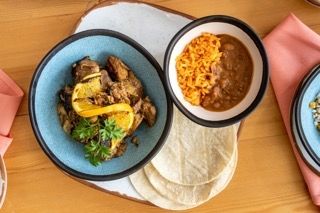Is Mexican Food Healthy? Unpacking the Nutritional Conveniences of Typical Components
The question of whether Mexican food is healthy invites an exploration of its traditional components. Beans and corn act as foundational staples, abundant in protein and fiber. Avocados provide valuable fats, while various herbs and seasonings add flavor and health benefits - lunch and dinner. With each other, these components produce a tapestry of nutrition. The healthfulness of Mexican food frequently depends on preparation approaches and section dimensions. What function do these aspects play in determining its overall dietary worth?
The Power of Beans: Protein and Fiber-Rich Staples
Although usually forgotten, beans act as a keystone of Mexican food, using a wealth of nutritional advantages. Rich in protein, they are an excellent plant-based option for those looking for to satisfy their dietary protein requires. This high healthy protein web content sustains muscle mass repair work and growth, making beans indispensable for both meat-eaters and vegetarians alike. In addition, beans are a remarkable resource of nutritional fiber, which aids in digestion and promotes a sensation of volume, possibly aiding with weight management.
The variety of beans utilized in Mexican recipes, such as black beans, pinto beans, and kidney beans, contributes to a varied flavor profile and can improve meals nutritionally. Additionally, beans are low in fat and consist of necessary nutrients, consisting of folate, magnesium, and iron. With each other, these attributes make beans an essential component, delivering both nutrients and sustenance in typical Mexican fare.
Corn: a Versatile Grain With Nutritional Conveniences
Corn stands apart as a functional grain fundamental to Mexican food, celebrated not only for its cooking applications however additionally for its outstanding dietary profile. As a main active ingredient in dishes like tortillas, tamales, and pozole, corn gives necessary nutrients that add to a balanced diet regimen. Rich in carbs, it functions as a considerable power resource, while likewise being reduced in fat, making it a favorable alternative for various dietary needs.
Corn is a good source of nutritional fiber, which assists in food digestion and promotes satiety. It includes significant amounts of vitamins such as B-complex vitamins, which are crucial for basal metabolism. The existence of antioxidants, particularly carotenoids, adds to general health by minimizing oxidative tension. Additionally, corn is gluten-free, dealing with those with gluten level of sensitivities. Overall, the dietary advantages of corn underscore its significance in conventional Mexican food and its duty in a healthy and balanced diet regimen.
Avocados: Healthy Fats and Nutrients in Every Bite
Avocados play a substantial role in Mexican food, complementing meals with their velvety appearance and rich taste. Beyond their cooking appeal, avocados are commemorated for their impressive nutritional profile. They are a rich source of healthy and balanced monounsaturated fats, which can aid reduced poor cholesterol degrees and support heart health and wellness. Furthermore, avocados are packed with important vitamins and minerals, including potassium, vitamin E, and B vitamins, adding to total health.
The high fiber web content in avocados help digestion and promotes satiation, making them a valuable addition to any type of meal. Their one-of-a-kind nutrient make-up can likewise support skin wellness and supply anti-inflammatory benefits. Integrating avocados into typical Mexican meals or enjoying them as a standalone treat can improve both taste and nutrition, demonstrating why they are a cherished staple in Mexican cuisine. Overall, avocados offer a delicious way to take visit this page pleasure in healthy and balanced fats and vital nutrients in every bite.

Herbs and flavors: Flavorful Health And Wellness Boosters
While appreciating the rich tastes of Mexican food, one can not ignore the essential function that spices and natural herbs play in enhancing both taste and wellness. Ingredients such as chili, cilantro, and oregano peppers not only add to the vivid flavor profile however additionally provide considerable health advantages. Cilantro is recognized for its cleansing properties, helping to get rid of hefty metals from the body, while oregano is packed with antioxidants and has anti-inflammatory results.
Chili peppers, a staple in many Mexican meals, consist of capsaicin, which has been linked to enhanced metabolic process and discomfort alleviation. In addition, spices like cumin and coriander assistance digestion and may help in blood sugar level law. Including these savory wellness boosters into meals not only boosts the cooking experience however likewise promotes overall wellness, making Mexican cuisine not just delicious, yet additionally nutritionally helpful.
Standard Cooking Approaches: Enhancing Nourishment and Taste
Traditional food preparation techniques in Mexican cuisine play a vital function in enhancing both nourishment and taste, as they often focus on classic strategies and fresh active ingredients. Strategies such as nixtamalization, where corn is saturated and cooked in an alkaline service, not just boost the nutrient account of tortillas yet likewise improve their digestibility - freshly made guacamole. Additionally, making use of sluggish cooking approaches, like stewing or braising, permits flavors to fuse magnificently while retaining the integrity of the active ingredients

Often Asked Concerns
Are Mexican Food Portions Usually Larger Than Other Cuisines?
Mexican food sections are usually bigger than those of several other cuisines. This particular shows conventional eating methods, highlighting common sharing and hearty meals, which can result in a more substantial offering size overall.
Exactly how Does the Preparation Method Affect Healthfulness of Mexican Food?
Preparation approaches considerably influence the healthfulness of Mexican food. Methods such as barbecuing or steaming protect nutrients, while frying can increase undesirable fat content. Selections of ingredients and cooking designs eventually establish general dietary value.
Can Mexican Food Be Customized for Particular Nutritional Limitations?
Mexican food can without a doubt be tailored for details dietary constraints. Alternatives, such as making use of corn tortillas for gluten-free diets or including more vegetables, make it possible for individuals to appreciate conventional flavors while suiting numerous nutritional requirements.
What Are Common Misconceptions Regarding Mexican Food and Health?
Usual misconceptions regarding Mexican food consist of the belief that it is inherently undesirable, extremely spicy, and exclusively concentrated on fats. In truth, traditional meals usually feature nourishing ingredients and can be tailored to different nutritional demands.
Are There Healthier Options at Mexican Restaurants?
Healthier choices at Mexican dining establishments usually include grilled meats, beans, and fresh vegetables. Selecting meals that stress whole ingredients and staying clear of hefty sauces can cause an extra nourishing eating experience, promoting general wellness.
The selection of beans made use of in Mexican recipes, such as black beans, pinto beans, and kidney beans, contributes to a varied flavor profile and can improve dishes nutritionally. Avocados play a considerable function in Mexican food, matching meals with their velvety structure and rich taste. Integrating avocados into traditional Mexican dishes or appreciating them as a standalone treat can boost both taste and nutrition, demonstrating why they are a beloved staple in Mexican cuisine. While appreciating the abundant flavors of Mexican cuisine, one can not overlook the essential role that spices and natural herbs play in boosting both preference and wellness. Typical cooking techniques important link in Mexican cuisine play a necessary duty in boosting both nutrition and taste, as they typically prioritize fresh active ingredients and classic methods.